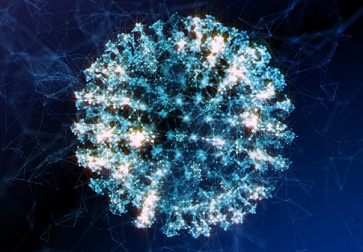COVID-19 Latest Headlines: Harvard Study Identifies Over 800 Epitopes On SARS-CoV-2 Genome Using VirScan, A Serological Analysis Platform
Source: COVID-19 Latest Headlines Sep 30, 2020 4 years, 9 months, 1 week, 2 days, 11 hours, 27 minutes ago
COVID-19 Latest Headlines: Researchers from Brigham and Women's Hospital and Harvard Medical School have utilized VirScan, a technology that can determine which of more than 1,000 different viruses have infected an individual including SARS-CoV-2 to discover more than 800 epitopes on the SARS-CoV-2 genome. The epitope is the part of an antigen molecule to which an antibody attaches itself to.

Understanding humoral responses to SARS-CoV-2 is critical for improving diagnostics, therapeutics, and vaccines.
In the study, deep serological profiling of 232 COVID-19 patients and 190 pre-COVID-19 era controls using VirScan revealed over 800 epitopes in the SARS-CoV-2 proteome, including 10 epitopes likely recognized by neutralizing antibodies. Pre-existing antibodies in controls recognized SARS-CoV-2 ORF1, while in only COVID-19 patients primarily recognized spike and nucleoprotein.
A machine learning model trained on VirScan data predicted SARS-CoV-2 exposure history with 99% sensitivity and 98% specificity; a rapid Luminex-based diagnostic was developed from the most discriminatory SARS-CoV-2 peptides. Individuals with more severe COVID-19 exhibited stronger and broader SARS-CoV-2 responses, weaker antibody responses to prior infections, and higher incidence of CMV and HSV-1, possibly influenced by demographic covariates.
The research findings were published in the journal: Science
https://science.sciencemag.org/content/early/2020/09/28/science.abd4250
Virscan is a tool designed to detect viral history in a drop of blood can also detect evidence of infection from coronaviruses, including SARS-CoV-2. By suing it, the study team was able to discover a trove of details about the antibody response to SARS-CoV-2 and how this response may differ in individuals who go on to have a more severe case of COVID-19.
Corresponding author Dr Stephen Elledge, Ph.D., the Gregor Mendel Professor of Genetics at the Brigham and Harvard Medical School told Thailand Medical School, "This may be the deepest serological analysis of any virus in terms of resolution.We now understand much, much more about the antibodies generated in response to SARS-CoV-2 and how frequently they are made. The next question is, what do those antibodies do? We need to identify which antibodies have an inhibitory capacity or which, if any, may promote the virus and actually help it enter into immune cells."
The study team looked in depth at antibody responses to SARS CoV-2 by using VirScan to analyze blood samples from 232 COVID-19 patients and 190 pre-COVID-19 era controls.
Interestingly, the study team identified 800 sites of the SARS-CoV-2 coronavirus that the immune system can recognize, known as epitopes.
It must be noted that not all epitopes are created equal; some may be recognized by neutralizing antibodies, which can elicit a response that eliminates the infection.
Should however the body creates antibodies against other epitopes, it may launch a less effective response, giving the virus an advantage.
Importantly in some cases, especially in the case of
coronaviruses, these viruses may even be able to benefit from the body's antibody response, using antibodies to enter cells in a phenomenon known as antibody-dependent enhancement.
The team detected a range of antibody frequencies against various epitopes in the case of SARS-CoV-2 coronavirus.
Most were public epitopes ie regions recognized by the immune systems of large numbers of patients. One public epitope was recognized by 79 percent of COVID-19 patients. Others are considered private and recognized by only a few or even one individual.
Significantly, ten epitopes were in regions essential for viral entry and are likely recognized by neutralizing antibodies.
The study team used the most discriminatory epitopes to develop a rapid diagnostic test.
The researchers's epitope findings may have important implications for vaccines.
Should the immune system's response to public epitopes isn't found to be protective or even gives the virus an advantage, vaccines will need to target other regions of the virus to give the immune system a boost.
Interestingly the study team found that there are several epitopes conserved across coronaviruses, and that the immune system is likely to try to reuse antibodies against them when infected with SARS-CoV-2 a possible explanation for why so many serology tests for COVID-19 produce false positives.
The researchers further analyzed where and when different antibody responses occurred, finding that patients with severe COVID-19 were more likely to launch a stronger, broader response against SARS-CoV-2, possibly because their initial immune response failed to control the infection early.
It was found that within hospitalized patients, males made more antibodies than females.
The researchers also compared the viral histories of hospitalized and non-hospitalized COVID-19 patients and found that hospitalized patients were much more likely to have had CMV and HSV-1, two common herpes viruses.
The researchers however note that it is difficult to draw conclusions about causality given that the group of non-hospitalized patients was younger and consisted of a higher percentage of white people and women, a demographic group that generally have lower CMV infection rates.
Dr Elledge envisions their studies as a stepping stone for identifying the most effective antibodies and eliciting them.
Dr Elledge commented, "Our study findings illuminate the landscape of antibody responses in COVID-19 patients. Next, we need to identify the antibodies that bind these recurrently recognized epitopes to determine whether they are neutralizing antibodies or antibodies that might exacerbate patient outcomes. This could inform the production of improved diagnostics and vaccines for SARS-CoV-2."
Deep serological profiling can provide a window into the breadth of viral responses, how they differ in patients with diverse outcomes, and
how past infections may influence present responses to viral infections. Understanding the epitope landscape of SARS-CoV-2, particularly within S, provides a stepping stone to the isolation and functional dissection of both neutralizing antibodies and antibodies that might exacerbate patient outcomes through ADE and could inform the production of improved diagnostics and vaccines for SARS-CoV-2.
For more
COVID-19 Latest Headlines, keep on logging to Thailand Medical News.
